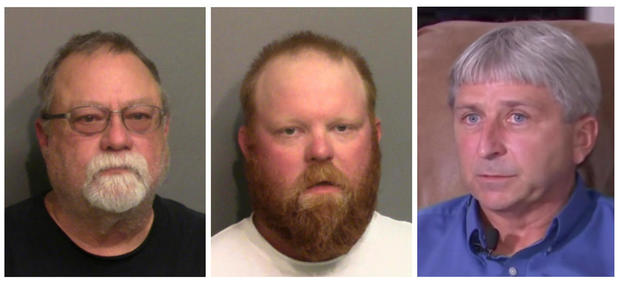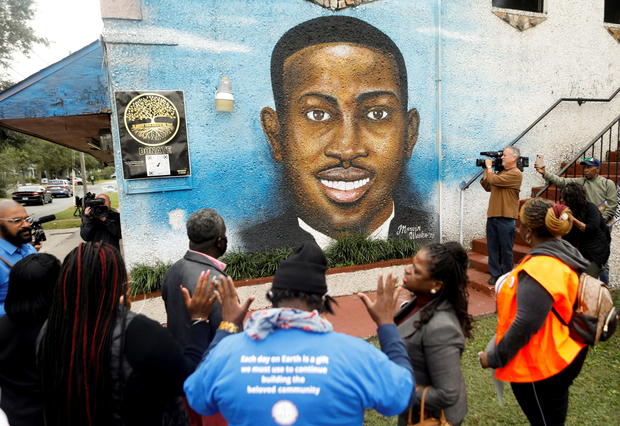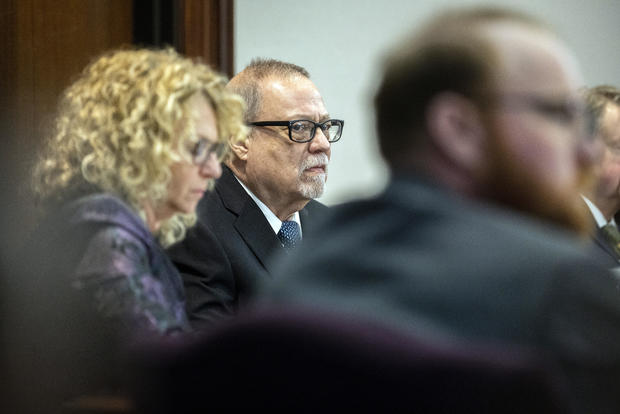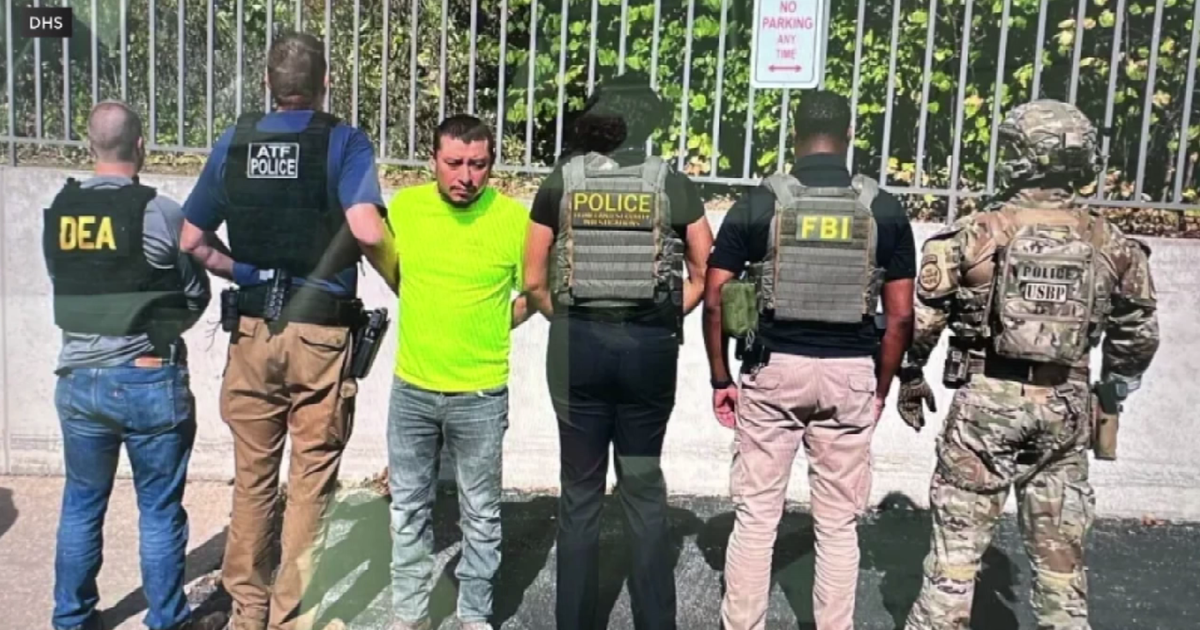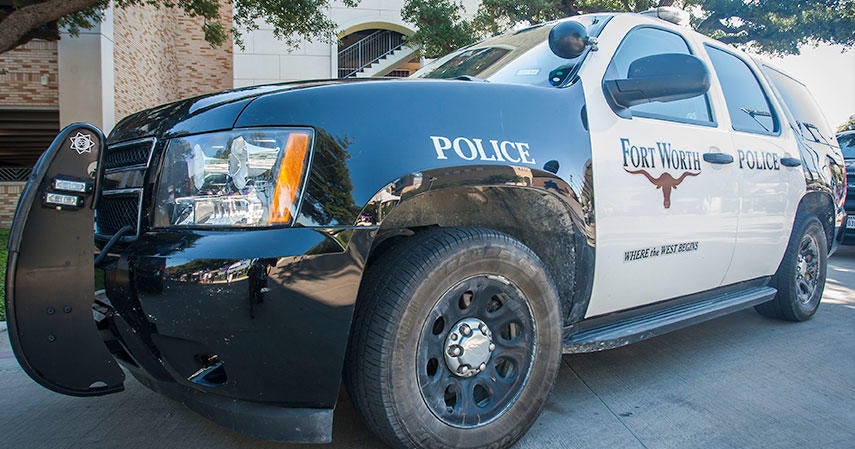Closing arguments in trial for Ahmaud Arbery's killing focus on citizens' arrest law and claim of self-defense
Prosecutors and defense attorneys delivered closing arguments Monday in the trial of the three men charged with killing Ahmaud Arbery in Brunswick, Georgia, in February 2020.
Travis McMichael, his father Gregory McMichael and their neighbor William "Roddie" Bryan have all been charged with murder and other counts for the death of Arbery, a 25-year-old Black man who was jogging in the neighborhood.
Over the course of nearly seven hours Monday, the jury heard first from the prosecution and then from lawyers representing each of the three defendants. The prosecution will return to deliver the rebuttal portion of their closing arguments when court reconvenes at 8:30 a.m. ET Tuesday.
Prosecutors say Arbery was out for a jog when the suspects, who are White, chased him through the neighborhood, cornered him with their pickup trucks and shot him.
Travis McMichael testified that they pursued Arbery because they thought he he might have had something to do with recent burglaries in the area — though no evidence linked him to such crimes. Cellphone video shows McMichael get out of his truck armed with a shotgun and struggle with Arbery in the street before firing the fatal shots at close range.
"It was obvious that he was attacking me," McMichael testified last week, calling it a "life-or-death situation."
But under cross-examination, he acknowledged that Arbery was "just running" when they approached him, and that Arbery had not threatened him.
The defense team argues that the three men acted out of self-defense and within the legal grounds of making a "citizen's arrest." One year after the killing, Georgia lawmakers repealed the state's "citizen's arrest" law, which dated back to the Civil War.
It took national outcry and the release of the video for charges to be brought in the case, two and a half months after Arbery was shot and killed.
Read all the highlights from Monday's closing arguments below.
Attorney for William "Roddie" Bryan says without his client "there is no case"
In an effort to distance his client from the McMichaels, William "Roddie" Bryan's defense attorney, Kevin Gough, reminded the jury that his client did not even know that the father and son were armed until moments before Arbery died, and that if Bryan had not filmed the incident there would be no charges in his death.
"Ladies and gentlemen, without Roddie Bryan there is no case," Gough told the jury.
He described his client as a "quiet man" who keeps to himself.
Gough said Bryan had been cooperative, sat with investigators without an attorney, and shared his cellphone video with the police.
He described his client as a "quiet man" who keeps to himself and was "guided" that day by "divine providence" or "karma." And he suggested that Bryan did not have a full understanding of the situation before he became involved.
"There is no evidence whatsoever of malice," Gough told the jury. "There is no evidence that Roddie Bryan intentionally helped Travis McMichael murder Mr. Arbery."
Gough contended that Arbery's death would have been just as likely whether Bryan were there or not, noting that Arbery would not have been able to "outrun" Travis McMichael's bullets.
"Mr. Bryan's presence doesn't contribute in a direct or substantial way to the death of Mr. Arbery," he said.
He walked the jury through the charges one by one and concluded his lengthy statement by urging the jury to find Bryan not guilty on all counts.
Judge denies defense's request for mistrial over demonstrations outside courthouse
The judge has denied a renewed motion from defense attorneys for a mistrial. This time the defense argued that demonstrations taking place outside the courthouse could be potentially prejudicial to jurors.
Specifically, the defense said there were people associated with the Black Panthers congregated outside the courthouse, as well as individuals who may be armed and others carrying coffins with names of the defendants. The defense expressed concern that this could influence the jurors and pose a security risk, saying, "This is no longer a figurative mob, this is a literal mob."
Judge Timothy Walmsley denied the request for a mistrial, saying that he had not been made aware of any exposure to the jury and that he has ensured they are "insulated," and that no security risk been brought to the court's attention.
Attorney for Gregory McMichael says Arbery "chose to fight"
Laura D. Hogue, who represents Gregory McMichael, began her closing argument after the lunch break. She spoke about how residents understandably want to protect the safety and security of their neighborhoods.
"Greg McMichael was absolutely certain" he'd seen an intruder, she said.
"Certainty, though, is way higher standard than what you need to find in this case," Hogue told the jury. "Certainty was way more knowledge than they needed to detain Ahmaud Arbery to execute a citizen's arrest."
She added that there are no "magic words" or signage that a person has to say or post in order to execute a citizen's arrest in Georgia, under the law that was in effect at the time. "It's your place and people should stay off it. We don't need to be telling people ahead of time and giving them warnings," Hogue explained to the jury.
Hogue recounted the evidence that Arbery had walked into a house that was under construction, and reminded the jury that the law states that nothing needs to have been taken from a property in order for a burglary to have been committed. Hogue doubles down, telling the jury, "Every single time Ahmuad Arbery goes into that house he is committing a burglary."
Hogue used phrases like "hightailing it" and "hauling ass" to describe to the jury Arbery trying to run away from the McMichaels.
"No verdict can change the grief of that future not realized," Hogue said of Arbery's untimely death. "His teenage years were full of promise, but his early twenties just led him in the wrong direction."
She disputed the state's characterization of Arbery as a "victim" in this case, and pointed the jury to the choices he made that brought him to the Satilla Shores neighborhood on those three occasions. Hogue said Arbery "was not an innocent victim."
"There was no legitimate reason for Ahmaud Arbery to be plundering" through the construction site, she continued. "He was a recurring nighttime intruder, and that is frightening and unsettling."
"No one is saying that Ahmaud Arbery deserved to die," Hogue told the jury. "He died because for whatever inexplicable, illogical reason, instead of staying where he was, whatever overwhelming reason he had to avoid being captured that day and arrested by police, he chose to fight. He chose to fight."
"Greg McMichael is not a murderer, he is not guilty," Hogue said.
The court is now taking a brief break, after which the jury will hear from the attorney representing William "Roddie" Bryan.
Travis McMichael's attorney: Focus on the "bare facts" and find him not guilty
Travis McMichael's defense attorney, Jason Sheffield, concluded his closing arguments by telling the jury that his client did not have to take the stand in his own defense but did so out of a sense of "duty and responsibility" because he wanted to share his side of the story.
Seffield then turned the question to the jury, and urged them to do their duty and review the "bare facts" as well as the "overwhelming" evidence of the case and find that McMichael's actions were justifiable under the law.
The jury was then excused for a lunch break.
Defense argues Travis McMichael believed Arbery committed a burglary
Jason Sheffield, who represents Travis McMichael, delivered the closing arguments for the defense.
"Travis McMichael spent almost a decade of his life learning about duty and responsibility," Sheffield said, referring to McMIchael's service in the Coast Guard. "He trained weekly, sometimes daily, on what the law provided that he do, what his responsibilities were, how he would make decisions at critical moments of policing and at critical moments of rescue."
Sheffield spoke of how the community was living in fear after a string of burglaries in the neighborhood, including at one house that was under construction. While throwing water on the claim that Arbery regularly jogged in the neighborhood of Satilla Shores, Sheffield noted that Arbery was seen on camera inside the construction site three different times, including on the day of the shooting, February 23, 2020.
"Reasonable and probable grounds of suspicion," Sheffield said, citing the legal standard to the jury. "Travis believes [Arbery]'s committed the offense of burglary."
Sheffield said that under the law, a person doesn't have to steal anything to have committed a burglary, and under Georgia's citizen's arrest law — which has since been repealed, but was in effect at the time — a person can detain another and may have a firearm while doing so.
"It is absolutely horrific and tragic that this has happened. And again this is where the law is intertwined with heartache and tragedy. You are allowed to defend yourself. You are allowed to use force that is likely to cause death or serious bodily injury if you believe it is necessary," Sheffield told the jury. "This is a law that is for a person in Travis' situation."
Prior to the jury being brought back in to hear the defense side, the state objected to some of the visual aids, photos and graphics the defense attorney planned on using in closing arguments that had not been testified to or entered into evidence.
State concludes closing arguments, tries to discredit self-defense claim
While breaking down the standards under Georgia law, the prosecutor leading the state's closing arguments tried to chip away at the defense's two-pronged strategy of claiming that the three men were acting out of self-defense and under the authority of the state's citizen's arrest law.
"Who brought the shotgun to the party?" prosecutor Linda Dunikoski asked the jury, arguing that the defendants themselves created the danger that they needed to claim self-defense for.
She asked the jury to use common sense to see beyond the defense's claim that the men acted reasonably when they made their "driveway decision," and compared the three defendants to "schoolyard bullies."
"Bottom line," Dunikoski said: "This was an attack on Ahmaud Arbery. They committed the crimes. They committed the four felonies. They attacked him, they shot and killed him."
Prosecutor: "This case is really about assumptions"
"This case is really about assumptions and driveway decisions," lead prosecutor Linda Dunikoski told the jury as she began closing arguments for the state.
"All three of these defendants made assumptions — made assumptions about what was going on that day, and they made their decision to attack Ahmaud Arbery in their driveways because he was a Black man running down the street."
Then she took aim at a key defense argument, saying: "This was not a citizen's arrest."
She argued that citizen's arrest doesn't apply in this case because the three men had no direct knowledge of a crime being committed. Instead, she said, their actions were based on "speculation."
She acknowledged that surveillance video showed Arbery spent several minutes wandering around a house under construction in the neighborhood the day of the shooting, but said he was simply a "looky-loo."
Dunikoski also urged jurors to be skeptical of Travis McMichael's testimony about the pursuit of Arbery because it differed in certain details from the account he gave police immediately after the shooting.
"Did Travis McMichael have a motive to lie to you? Did he have a motive to make up additional things that he had never said before? Did he have a motive to embellish his testimony? … The law allows you to disregard his testimony from the witness stand if you don't find it credible," she said.
What are the charges?
- Count 1: Malice murder
- Count 2: Felony murder
- Count 3: Felony murder
- Count 4: Felony murder
- Count 5: Felony murder
- Count 6: Aggravated assault
- Count 7: Aggravated assault
- Count 8: False imprisonment
- Count 9: Criminal attempt to commit a felony
The three men are also facing federal hate crimes charges. A separate trial in the federal case is scheduled to begin on February 7, 2022.
Makeup of the jury
The jury that will decide the case is made up of 1 Black juror and 11 White jurors. State prosecutors objected to the jury makeup, arguing that several potential Black jurors were cut because of their race.
Superior Court Judge Timothy Walmsley conceded that "intentional discrimination" by defense attorneys appeared to have shaped jury selection, but said his authority to intervene was limited under Georgia law.
In Glynn County, where Arbery was killed and the trial is being held, Black people account for nearly 27% of the population of 85,000, according to the U.S. Census Bureau. The judge said 25% of the pool from which the final jury was chosen was Black.
